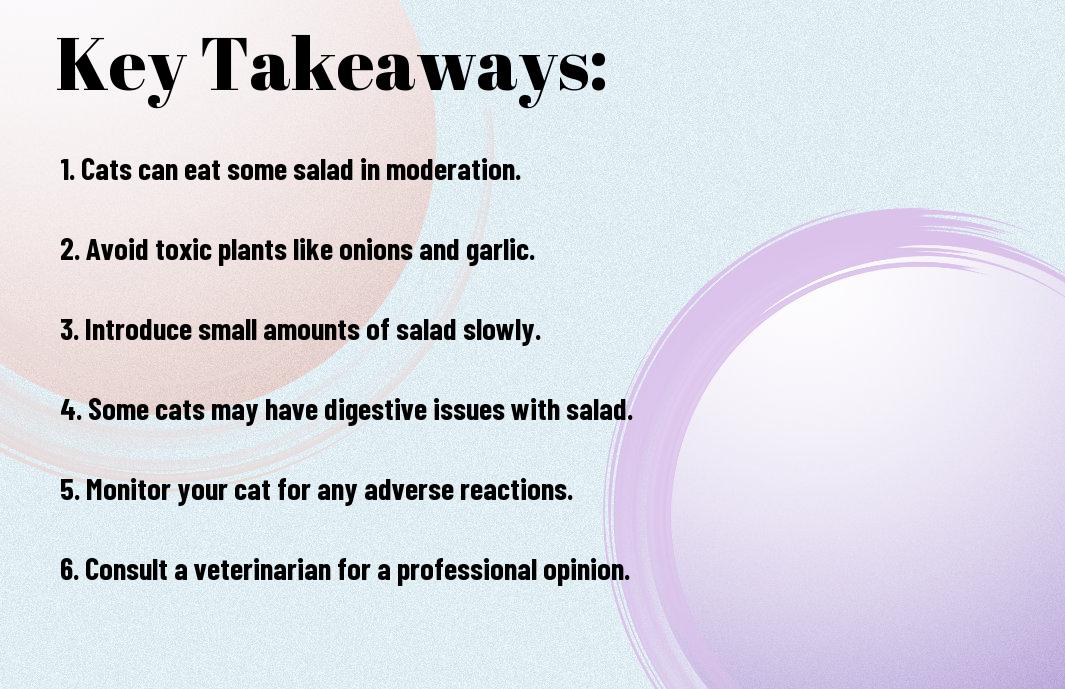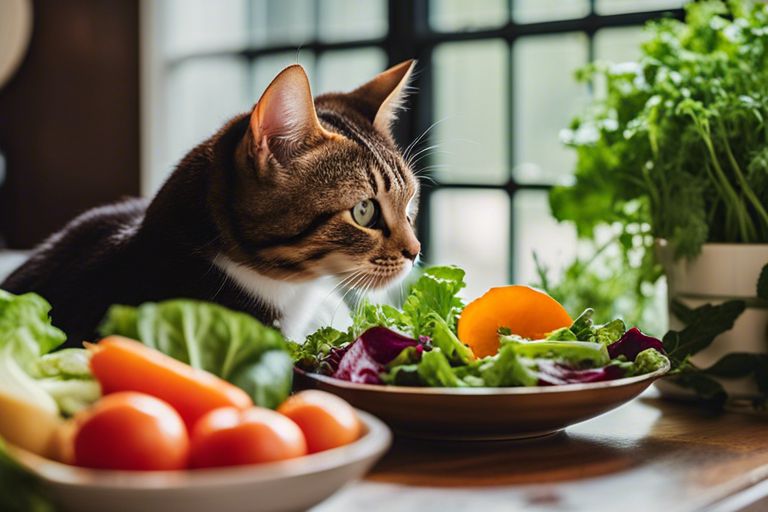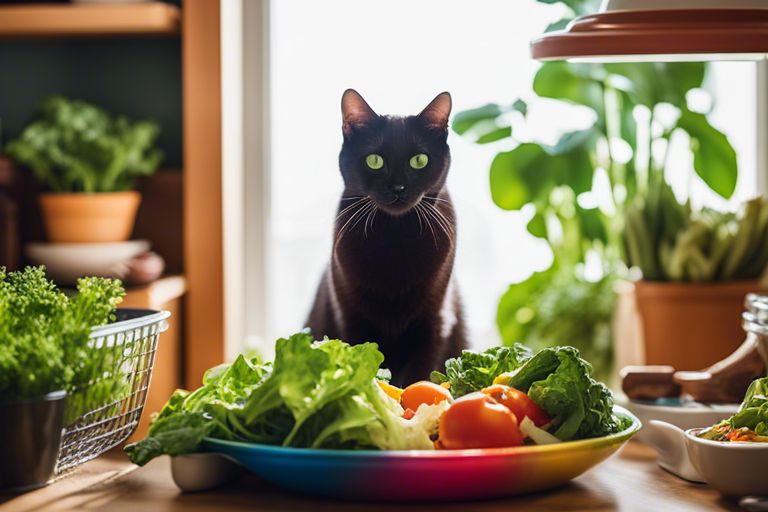Curious about whether you can feed your feline friend some of your salad? The answer is not as simple as a yes or no. While some types of salad can be safe for your cat to eat, others can be potentially harmful to their health. It’s important to know which ingredients are safe for your cat and which ones to avoid. In this blog post, we will explore the benefits and risks of feeding salad to your cat, and provide you with some guidelines for ensuring your cat’s safety when it comes to their dietary choices.

Nutritional Components of Salad
The nutritional components of salad can vary depending on the ingredients used. Salads typically contain a variety of vegetables, fruits, and sometimes nuts or seeds. These ingredients provide a range of vitamins, minerals, and other essential nutrients that can be beneficial for your overall health.
Vitamins and Minerals in Common Salad Ingredients
When it comes to the vitamins and minerals in common salad ingredients, you will find a range of essential nutrients that are important for your overall health. Leafy greens such as spinach and kale are high in vitamins A, C, and K, as well as folate and potassium. Tomatoes are a great source of vitamin C, potassium, and folate, while bell peppers are rich in vitamin C and other antioxidants. Cucumbers contain vitamin K and some trace minerals, while carrots are packed with beta-carotene, vitamin K, and potassium. These nutrients are essential for supporting your immune system, promoting healthy eyesight, and maintaining overall well-being.
Potential Hazards in Salad for Cats
While there are some beneficial vitamins and minerals in salad ingredients, there are also potential hazards for cats. For example, onions, garlic, and chives are commonly used in salads and can be toxic to cats. These ingredients can cause damage to your cat’s red blood cells, leading to anemia. Additionally, certain salad dressings and toppings, such as raisins, grapes, and nuts, can also be harmful to cats. It’s important to be mindful of these ingredients and avoid feeding them to your feline friend.

Benefits of Salad Ingredients for Cats
Assuming you are considering adding salad to your cat’s diet, it’s important to understand the potential benefits of different salad ingredients. While cats are obligate carnivores and require meat for their nutritional needs, certain salad components can offer some health benefits when consumed in moderation.
Safe and Healthy Greens for Feline Consumption
When it comes to safe and healthy greens for your cat, options like spinach and arugula can provide a good source of fiber, vitamins, and minerals. These greens are generally safe for your cat to consume in small amounts, but it’s important to ensure they are thoroughly washed to remove any pesticides or other harmful substances. Additionally, overconsumption of these greens can lead to digestive upset, so it’s best to offer them as an occasional treat rather than a regular part of your cat’s diet.
Herbs and Plants That Can Benefit Feline Health
For cats, herbs such as parsley and dill can offer potential health benefits. These herbs are rich in antioxidants and can help support your cat’s overall immune system. Additionally, cat-friendly plants like wheatgrass can provide essential nutrients and help with digestion. However, it’s important to note that not all herbs and plants are safe for cats, so it’s crucial to research and ensure that any greens you offer are non-toxic and suitable for feline consumption.
By including a variety of safe and healthy greens in your cat’s diet, you can provide them with additional nutrients and potential health benefits. However, it’s crucial to remember that cats are obligate carnivores and require a primarily meat-based diet for their overall health and well-being. Always consult with your veterinarian before making any significant changes to your cat’s diet, including the introduction of salad ingredients.
Risks and Considerations
For the safety and well-being of your feline friend, there are several risks and considerations to keep in mind before adding salad to their diet. While some greens can be beneficial for cats, others can pose serious health risks.
Toxic Ingredients to Avoid in Cat Salads
When preparing a salad for your cat, it’s important to be aware of toxic ingredients that can be harmful to their health. Some common ingredients to avoid include onions, garlic, chives, and leeks, as these can cause damage to your cat’s red blood cells and lead to anemia. Additionally, certain herbs like parsley and chives can be toxic to cats, so it’s important to carefully research the ingredients you plan to include in your cat’s salad.
Understanding Portion Sizes and Frequency
It’s crucial to understand the appropriate portion sizes and frequency when it comes to feeding your cat salad. While leafy greens can be a healthy addition to your cat’s diet, it’s important to remember that their primary source of nutrition should come from a high-quality cat food. Feeding your cat salad in large quantities or too frequently can result in digestive upset and nutritional imbalances. As a general guideline, cat-safe vegetables can be offered in small amounts as an occasional treat, but should not make up a significant portion of their diet.

Alternatives to Salad
Not all cats enjoy salad, and that’s perfectly okay. If you want to introduce some veggies into your cat’s diet, there are other alternatives to consider. Lettuce, for example, can be a safe and healthy option for your feline friend. If you want to find out more about why cats can eat lettuce, including 4 feeding ways, you can read the article 6 Reasons Why Cats Can Eat Lettuce (With 4 Feeding Ways).
Recommended Feline-Friendly Vegetables
When it comes to vegetables that are safe for your cat, there are a few options to consider. Carrots can be a great addition to your cat’s diet as they are high in fiber and low in calories. Green beans and peas are also good choices, providing important nutrients without the risk of digestive issues. However, it’s important to remember that not all vegetables are safe for cats, so it’s essential to research before introducing any new food into their diet.
Commercial Cat Grass and Other Safe Options
If you’re looking for safe options to provide your cat with the benefits of greens, consider commercial cat grass. Cat grass is a safe and enjoyable way for your cat to munch on some greens, providing essential nutrients and aiding in digestion. Additionally, you can plant some cat-friendly herbs, such as catnip, mint, or parsley, in your garden or in a pot indoors for your cat to nibble on. These options can provide a safe and enjoyable way for your cat to get some greens in their diet.
Final Call
With these considerations in mind, it’s important to understand that some types of salad can be safe for your cat to eat, while others can be harmful. Be cautious when offering salad to your feline friend, and make sure to avoid any vegetables and dressings that could be toxic to them. Always consult with your veterinarian before introducing any new foods to your cat’s diet to ensure their safety and well-being. Remember, the health and safety of your furry companion should always be your top priority.
FAQ
Can cats eat salad?
Yes, cats can eat certain types of salad in moderation. However, some ingredients commonly found in salads can be toxic to cats, so it’s important to know what’s safe and what’s not.
What types of salad are safe for cats to eat?
Certain leafy greens such as spinach, kale, and arugula are safe for cats to eat in small amounts. Plain, unseasoned vegetables like cucumbers and bell peppers can also be given to cats as a treat. It’s important to avoid dressing, onions, garlic, and grapes, as they can be harmful to cats.
What are the potential risks of feeding salad to cats?
Some ingredients often found in salads, like onions and garlic, can be toxic to cats and should never be fed to them. Additionally, certain dressings and seasonings can upset a cat’s stomach. It’s also important to monitor the portion size of salad given to cats as too much can lead to digestive issues like diarrhea.

Hello there, I am Iftekhar Ahmed. I am the owner of Mishka & The Cat Corners. I love to explore and write on various topics about cats

